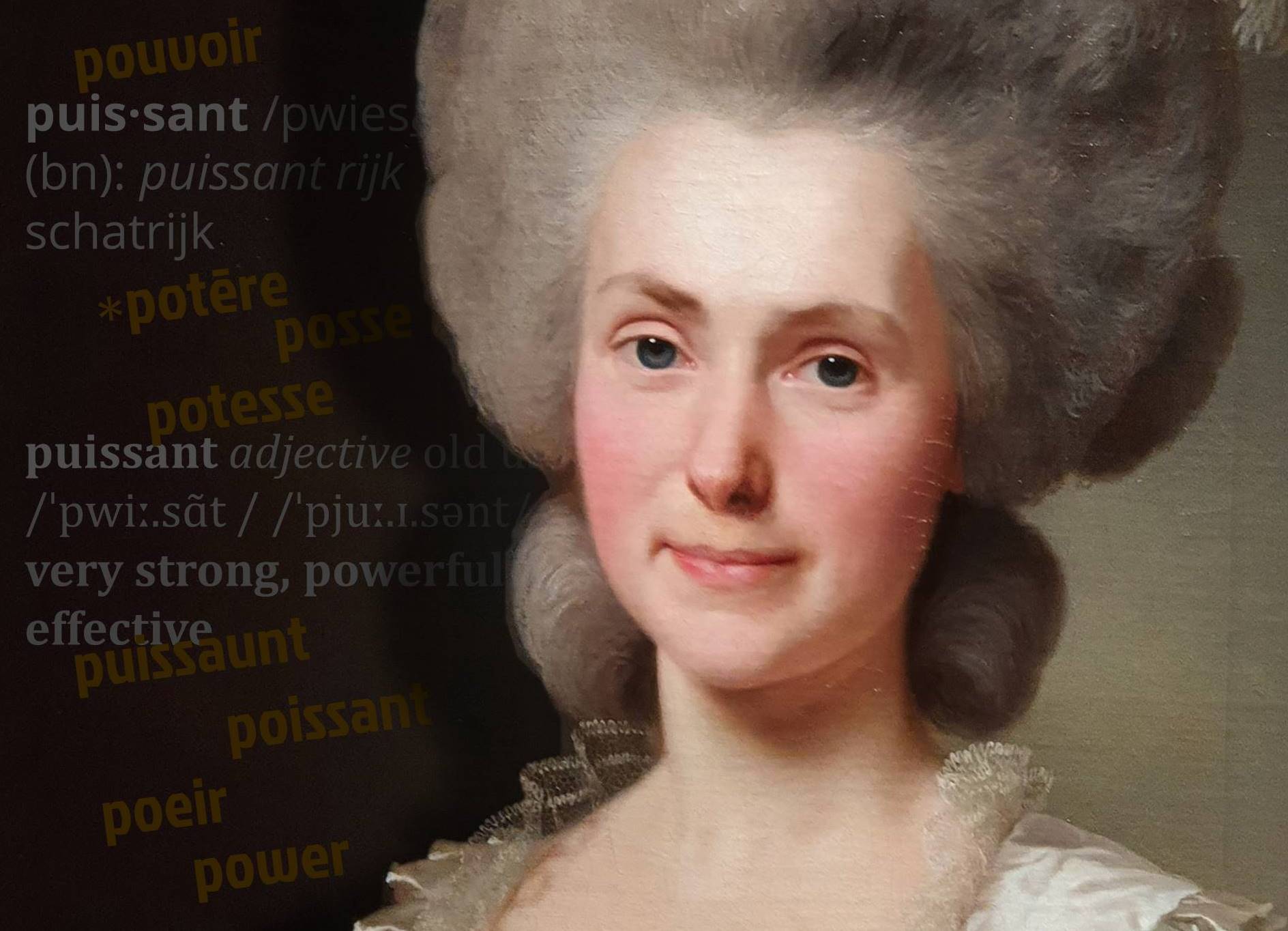WEST GERMANIC
Puissant
Linguistics
| 15-01-2021
Each language has its own vocabulary. Many words can be translated, but there are also very useful expressions - such as jarig zijn in Dutch or the English word very in combination with this moment - of which you wonder why other languages don't have them. On the other hand, there are words with such a specific meaning that it's surprising they still exist. The word puissant, for example.

Puissantly rich
Although according to the Woordenlijst Nederlandse Taal (Glossary of Dutch Language) of the Nederlandse Taalunie there are various declensions of puissant in Dutch, in practice the word is used almost exclusively in the combination puissant rijk (puissantly rich). The various dictionaries I have consulted all indicate the same. The constituent puissant rijk means something like "extremely rich", "incredibly rich", "wealthy" or "mighty rich" – zeer rijk, geweldig rijk, schatrijk or machtig rijk in Dutch, so as you see, Dutch has enough alternatives to indicate exactly the same as is said with puissant rijk. Why then does it have that word puissant, which is really only used as an adverb to the adjective rich?
Chic equivalent
I suspect that the survival of the word puissant has something to do with the fact that the word comes from French (puissant is an old present participle of pouvoir, so "being able" in English). Although the French court left the Netherlands a few centuries ago, many Dutch people still have a feeling that French words sound more upscale than their Dutch equivalent, I think. As a result, puissant rijk feels more like an abundance of opulence than when you use zeer rijk or schatrijk. It could be that this is different for the Dutch than for the Flemish, given the political situation in Belgium, but perhaps I'm jumping to conclusions now. Be that as it may, in a 2013 study by the Dutch Center for Reading Research, the word puissant was recognized by 81% of the Dutch and 75% of the Flemish. So anyway it's quite a common word.
Poeir
The word puissant also occurs in English. According to the Cambridge Dictionary, it means "very strong, powerful, and effective". It also says “old use”, so apparently the word is less common in English (and, since you are now reading this text in English, you probably know that better than I do). Still, I find it interesting to mention here, because the Online Etymology Dictionary provides more information about the origin of the word, which puts the Dutch usage in combination with rijk (rich) in context. In the mid-15th century, English knew the word as puissaunt; the origin, however, is still the Old French puissant, before that poissant and derived from poeir. Now, say that last word with an English accent… indeed, that's where the New English power comes from.
Power and money
All of the foregoing, just like the words potent and potential (or potentie in Dutch), can be traced back to Latin potis, which means "mighty, influential" (and which is very similar to the abbreviation POTUS for President of the United States, but that's a coincidence). And who were powerful and influential before democracy was invented? Exactly, rich people. You could also say that wealthy people often took power – something democracy unfortunately hasn't changed that much about in some countries – but the link between power and money is clear anyway.
Marie Jeanne Puissant
That finally brings us to the lady in the picture, with her mysterious smile (Mona Lisa, eat your heart out). That lady, clearly not a working-class girl, is Marie Jeanne Puissant. She lived from 1745-1828 and was immortalized in 1781 by Alexander Roslin. That is eight years before the French Revolution, which resulted, among other things, in the beheading of Marie Jeanne's brother François in 1794. He was a fermé générale, simply put someone who collected taxes, allegedly with a bonus for themselves. Their father was director of the Fermes de Rouen. So it was a very rich family, but the word 'puissant' has nothing to do with this family in terms of its origin. What could well be, however, is that it worked the other way around: I can imagine that Marie Jeanne's forefathers liked to have a name that indicated how potent they were – and with that I mean potent in the Early New Dutch sense "powerful, influential, possessing wealth'.

Puissantly rich
Although according to the Woordenlijst Nederlandse Taal (Glossary of Dutch Language) of the Nederlandse Taalunie there are various declensions of puissant in Dutch, in practice the word is used almost exclusively in the combination puissant rijk (puissantly rich). The various dictionaries I have consulted all indicate the same. The constituent puissant rijk means something like "extremely rich", "incredibly rich", "wealthy" or "mighty rich" – zeer rijk, geweldig rijk, schatrijk or machtig rijk in Dutch, so as you see, Dutch has enough alternatives to indicate exactly the same as is said with puissant rijk. Why then does it have that word puissant, which is really only used as an adverb to the adjective rich?
Chic equivalent
I suspect that the survival of the word puissant has something to do with the fact that the word comes from French (puissant is an old present participle of pouvoir, so "being able" in English). Although the French court left the Netherlands a few centuries ago, many Dutch people still have a feeling that French words sound more upscale than their Dutch equivalent, I think. As a result, puissant rijk feels more like an abundance of opulence than when you use zeer rijk or schatrijk. It could be that this is different for the Dutch than for the Flemish, given the political situation in Belgium, but perhaps I'm jumping to conclusions now. Be that as it may, in a 2013 study by the Dutch Center for Reading Research, the word puissant was recognized by 81% of the Dutch and 75% of the Flemish. So anyway it's quite a common word.
Poeir
The word puissant also occurs in English. According to the Cambridge Dictionary, it means "very strong, powerful, and effective". It also says “old use”, so apparently the word is less common in English (and, since you are now reading this text in English, you probably know that better than I do). Still, I find it interesting to mention here, because the Online Etymology Dictionary provides more information about the origin of the word, which puts the Dutch usage in combination with rijk (rich) in context. In the mid-15th century, English knew the word as puissaunt; the origin, however, is still the Old French puissant, before that poissant and derived from poeir. Now, say that last word with an English accent… indeed, that's where the New English power comes from.
Power and money
All of the foregoing, just like the words potent and potential (or potentie in Dutch), can be traced back to Latin potis, which means "mighty, influential" (and which is very similar to the abbreviation POTUS for President of the United States, but that's a coincidence). And who were powerful and influential before democracy was invented? Exactly, rich people. You could also say that wealthy people often took power – something democracy unfortunately hasn't changed that much about in some countries – but the link between power and money is clear anyway.
Marie Jeanne Puissant
That finally brings us to the lady in the picture, with her mysterious smile (Mona Lisa, eat your heart out). That lady, clearly not a working-class girl, is Marie Jeanne Puissant. She lived from 1745-1828 and was immortalized in 1781 by Alexander Roslin. That is eight years before the French Revolution, which resulted, among other things, in the beheading of Marie Jeanne's brother François in 1794. He was a fermé générale, simply put someone who collected taxes, allegedly with a bonus for themselves. Their father was director of the Fermes de Rouen. So it was a very rich family, but the word 'puissant' has nothing to do with this family in terms of its origin. What could well be, however, is that it worked the other way around: I can imagine that Marie Jeanne's forefathers liked to have a name that indicated how potent they were – and with that I mean potent in the Early New Dutch sense "powerful, influential, possessing wealth'.
WEST GERMANIC
In the West Germanic section, I regularly discuss a word that strikes me. I look at the meanings and forms of the word, and especially at where the word originates from. With that I compare the four West Germanic languages Dutch, English, Frisian and German, with the occasional inevitable trip across the fictional West Germanic border.
Sources
- Etymological dictionaries: etymologiebank.nl, Online Etymology Dictionary.
- Other dictionaries: Vandale.nl, Van Dale Middelgroot woordenboek Nederlands (2015), Het Groene woordenboek (2002), Van Dale Studiewoordenboek Engels-Nederlands (2006), WikiWoordenboek, De Geïntegreerde Taalbank, Cambridge Dictionary, larousse.fr.
- Wikipedia.fr: Fermiers généraux pendant la Terreur en Ferme générale.
- Wikipedia.nl: Ancien régime.
- histoforum.net.
- Image: own editing of own photo of a detail from Alexander Roslin, Marie Jeanne Puissant (1745-1828), 1781; Collection Rijksmuseum Twenthe.
